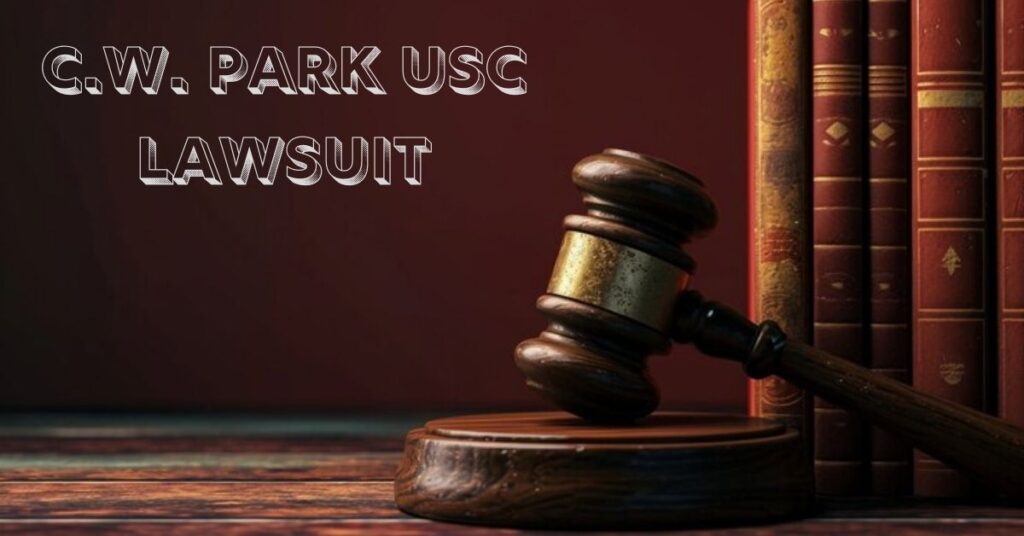W. Park USC lawsuit has captured the attention of many, stirring up conversations across campus and beyond. As details continue to emerge, questions linger about its implications for students, faculty, and the broader university community. With a spotlight on both allegations and responses from USC, this case is more than just a legal matter; it’s a pivotal moment that could reshape perceptions of one of America’s leading universities. Let’s delve into who exactly is affected by this unfolding situation and what it means for everyone involved.
Background on C.
W. Park and USC
W. Park is a notable figure in the academic landscape, particularly within the realm of education and research at USC. His expertise has contributed significantly to various departments.
The University of Southern California (USC) itself boasts a rich history as one of the leading private research universities in California. With its vibrant campus life and diverse student body, it attracts individuals from all over the globe.
Park’s association with USC has been marked by both recognition and controversy. As an influential member, he has played key roles in several initiatives aimed at enhancing educational programs.
However, his prominence also brings scrutiny. The dynamics between personal conduct and institutional reputation are now under examination due to recent developments surrounding him and USC. This situation highlights ongoing discussions about accountability within academia.
The Allegations Against C.W. Park and USC
W. Park USC lawsuit has raised serious concerns regarding alleged misconduct at the university. Central to the case are claims of discriminatory practices tied to admissions and faculty hiring processes.
Specific allegations suggest that certain groups were favored over others, creating an uneven playing field for prospective students and staff alike. Witnesses have described experiences of bias that contradict USC’s commitment to diversity.
Moreover, some reports indicate a lack of transparency in how decisions were made within departments. This has led to frustrations among those who feel their qualifications were overlooked.
The implications extend beyond academic integrity; they touch on trust within the community itself. Students and faculty are left questioning whether their voices truly matter in shaping the institution’s future policies and culture.
Impact on Students and Faculty
W. Park USC lawsuit has stirred significant concern among students and faculty alike. Many feel uneasy about the potential ramifications on their academic environment. The allegations have sparked discussions regarding transparency and ethical conduct within the university.
Students are particularly anxious about how this situation might affect their education. They worry that resources may be diverted to address legal issues rather than enhancing learning opportunities.
Faculty members, too, find themselves in a precarious position. Their reputations could be impacted depending on how the university manages this crisis. Support systems are being scrutinized as they navigate these uncertain waters together with students.
Moreover, some educators express frustration over the distraction from teaching responsibilities that such lawsuits can bring. The focus shifts away from academics toward broader institutional challenges, creating an atmosphere of uncertainty and tension across campus spaces.
Reactions from the University and Community
The reactions from the University of Southern California and its surrounding community have been mixed. Many students expressed shock and concern, highlighting the potential implications for their educational environment. Social media platforms buzzed with discussions, reflecting a spectrum of emotions.
USC officials released statements emphasizing their commitment to transparency and cooperation during legal proceedings. They reassured stakeholders that they are taking the allegations seriously.
On campus, student organizations held meetings to discuss the lawsuit’s ramifications. Some advocated for reforms in university policy to prevent similar situations in the future. Others voiced their support for those affected by any wrongdoing.
Community members also chimed in, holding vigil events to show solidarity with victims of misconduct. The atmosphere remains charged as everyone navigates this challenging chapter together.
Steps Taken by USC to Address the Lawsuit
USC has initiated several measures in response to the C.
W. Park lawsuit. The university promptly assembled a dedicated task force to investigate the allegations thoroughly.
This group includes legal experts, faculty members, and student representatives. Their goal is to ensure all voices are heard during this process.
Additionally, USC has committed to increasing transparency regarding its operations and decision-making processes. This move aims to rebuild trust within the community.
Workshops and seminars are being organized for both students and staff. These sessions focus on understanding rights, responsibilities, and reporting mechanisms related to misconduct.
Furthermore, USC has reached out for external assessments from independent agencies. This step highlights their commitment to an unbiased review of the situation at hand.
The administration emphasizes ongoing communication with stakeholders while navigating these challenging waters.
Conclusion
W. Park USC lawsuit has stirred significant conversation within the university community and beyond. With allegations that have drawn attention to both C.
W. Park and USC, many are left wondering about the implications for students, faculty, and staff.
As details emerge, it is clear that this legal matter affects not just those directly involved but also the broader campus environment. The reactions from various stakeholders highlight a collective concern for maintaining integrity in academia while ensuring support for all affected parties.
USC’s response indicates a commitment to addressing these serious issues head-on. By implementing measures to foster transparency and dialogue, the university aims to reassure its community during this tumultuous time.
As developments continue to unfold in this case, staying informed will be crucial for everyone connected with USC—students, faculty members, alumni, and local residents alike. The ongoing discourse around accountability in higher education is vital as we navigate through such complex scenarios together.



